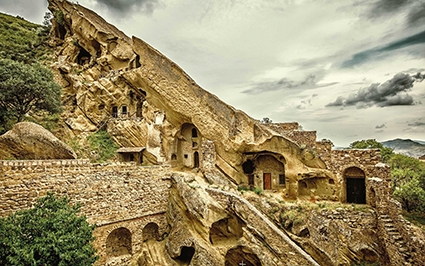European Experts Publish Report on Georgia’s David Gareji Monastery Complex
Europa Nostra, the most representative heritage organization in Europe, published a technical report on the rehabilitation of the David Gareji Monasteries and Hermitages in Georgia, listed among the 7 Most Endangered heritage sites in Europe in 2018, following a nomination made by the Georgian Arts and Culture Center.
A special group of experts, who visited the complex in November 2018, studied the ancient cave-city complex and had several meetings with the locals and authorities in order to devise a report on the current state of the site, as well as recommendations for future actions.
The report, published last week, identified two main threats that face the David Gareji Complex. One threat is degradation of the physical structure and artworks.
“Due to seismic risk, water percolation and the soft and porous nature of the limestone rocks in which the monasteries were hewn, the structure is liable to crumble when exposed to cycles of heat and cold. This has a detrimental effect on the artwork on the interior walls once the cavity is no longer sheltered by the overarching slabs of stone,” the report reads.
Another threat named by the experts is vandalism and graffiti.
“Continued unlawful practices such as souvenir-taking and graffiti have contributed to the degradation of the site. The sheer size of the site unfortunately makes this difficult to control, since providing security for the whole complex is rather unrealistic,” the experts said, adding an increase in visitors might lead to a sense of social pressure, in turn discouraging this type of behavior.
The group of experts also released some recommendations that should be followed in order to slow down the destruction of the 6th century cultural site:
• Prioritize the sites that are at the greatest risk. With so many sites, each with its own physical characteristics, historical values, archaeological risks, and limited short-term resources, it would be impossible to guarantee protection for each.
• In the short term, the structural stability of each cave site needs to be assessed through geo-structural analysis.
• Safe access to the sites is needed to set up preliminary security systems to both monitor their geographical stability and to discourage any unwanted visitors with bad intentions.
• The erection of a well-rounded visitor center and museum would allow exhibition of the artefacts that were discovered and also efficient servicing of increasing flows of tourism.
The experts also added that there is a lot of potential to develop the area into a viable destination for sustainable cultural tourism.
The David Gareji Monasteries and associated Hermitages comprise 21 identified monastery complexes and at least 5000 individual cells and sanctuaries carved out of the rock across the Lori plateau in south-eastern Georgia. While all the structures were historically located in Georgia, changing borders, particularly in Soviet times, means that one site, Bertubani, is in Azerbaijan, while two monasteries lie between Georgia and Azerbaijan.
Although the border is disputed and is therefore subject to some political tensions, a site visit was agreed between the border authorities at the working level, allowing access to the Udabno lavra.
The earliest structures have been dated to the 6th century and are associated with St David Gareji, or Garejeli. He was one of the thirteen Assyrian fathers who established the cluster of monasteries and developed both the monastic life on the site and the Christian Church across the wider region.
The David Gareji Monasteries and Hermitages are under the ownership of the Patriarchate of Georgia.
“It is still an active monastery center with daily services, and this adds to its importance and underlines the urgency of its preservation,” the organization said.
Georgian President Salome Zurabishvili, who visited the site with Europa Nostra representatives on April 20, also called for the urgent restoration of the David Gareji Monastery Complex.
"It is clear that it is necessary to restore this monument very quickly. That is why Europa Nostra declared Davit Gareji as a monument in danger. It is necessary to start the restoration of the complex as soon as possible and we should also urgently solver the border issue," said the President.
Zurabishvili also signed the ‘Berlin Call to Action’ document which was presented by The Secretary-General of Europa Nostra, Sneška Quaedvlieg-Mihailovic.
The document names the protection of cultural heritage as a political and individual priority. Those that sign the pledge take the responsibility to protect cultural heritage and set the ground for a more peaceful, successful, and inclusive Europe.
Europa Nostra is the pan-European federation of heritage NGOs which is also supported by a wide network of public bodies, private companies and individuals. Covering more than 40 countries in Europe, the organization is the voice of civil society committed to safeguarding and promoting Europe’s cultural and natural heritage.
By Thea Morrison
Source: time2georgia.com











